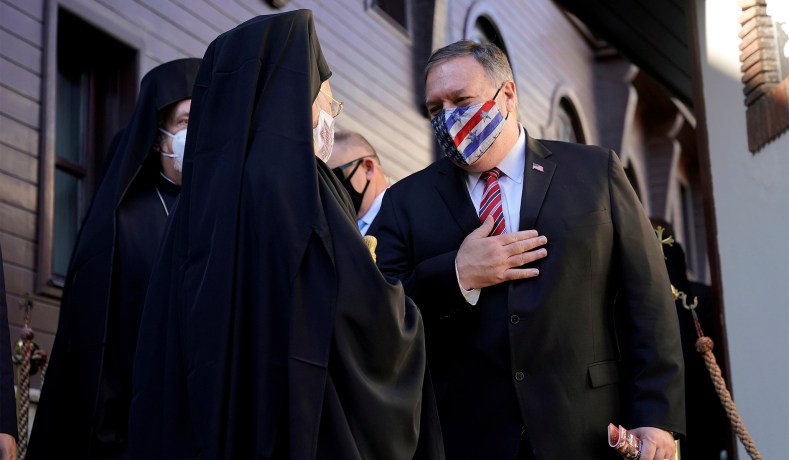Pompeo’s unusual visit and the dire state of Turkey-US relations
https://arab.news/6rwhb

US Secretary of State Mike Pompeo was in Turkey this week as part of his seven-nation tour of Europe and the Middle East. The nature of the visit and his remarks ahead of it had caused intense debate. Throughout his regional tour, Pompeo has met with top officials, but Turkey, a NATO ally, has been the only exception. No meeting took place between Pompeo and any Turkish official during his visit to the country.
This was not the first time Pompeo had skipped Turkey while on a visit to the region. In September, Pompeo visited Cyprus on the heels of the US lifting its arms embargo on the Greek Cypriot administration. He then visited Greece two weeks later. On both trips, Turkey was not included on his itinerary. Top US diplomats have traditionally visited Turkey and Greece on the same tour, but Pompeo abandoned this balanced policy with his recent trip. So this week’s stopover in Turkey with no official meetings was unprecedented in Turkish-American diplomatic history.
In Istanbul, Pompeo met with Ecumenical Patriarch Bartholomew I, the leader of roughly 300 million Orthodox Christians, who he said in a tweet was “a key partner” in efforts “to champion religious freedom around the globe.” He also met with the apostolic nuncio to Turkey, Archbishop Paul Russell. Interestingly, religious freedom was the only issue on his agenda despite the simmering disputes between Ankara and Washington on several issues, ranging from Syria to the eastern Mediterranean.
The US side stated that Pompeo’s tight travel itinerary prevented him from meeting Turkish state officials in Ankara, but he “was open to seeing any Turkish officials” in Istanbul. From the Turkish side, according to diplomatic customs, Pompeo had to make an official visit to Ankara for bilateral talks to take place. It is quite unusual in Turkish diplomatic culture for a top official to receive a foreign guest in any other way. In his book “Suits and Uniforms,” author Philip Robins described Turkey’s bureaucratic-diplomatic traditions. He wrote: “The bureaucracy has historically been the object of awe and deference in Turkey. Since the Ottoman bureaucracy, the Foreign Ministry was an elite within the elite. The ethos of the Foreign Ministry as a center of bureaucratic excellence persists in contemporary Turkey.”
The Ministry of Foreign Affairs — the center of Turkey’s foreign policymaking — follows a protocol-based approach in international affairs. However, this does not mean that there have not been exceptions in bypassing the protocol for some foreign guests. On such occasions in the past, Turkish officials were criticized by the media and opposition for not receiving some foreign heads of state according to diplomatic customs. Normally, all foreign dignitaries are received in the presidential palace and any deals are signed there. However, there have been occasions when the Turkish president has met a foreign guest at a hotel. At such times, Turkish officials have explained the breach of protocol as being down to Turkey’s desire to improve dialogue with the visiting leader.
In this instance, from the Turkish officials’ cold shoulder to Pompeo after he allegedly refused to travel to the capital, it can be clearly understood that there was no will from the Turkish side to have any dialogue with him.
In fact, it would not be wrong to consider Pompeo’s failure to meet with any Turkish official during his trip as a loss in Turkey-US relations. Given the deep differences of opinion between the two countries on almost any issue, it would be unrealistic to expect a positive outcome from any possible meeting. And it seems the Turkish side did not want to waste a minute with an outgoing American official known for his anti-Turkey rhetoric.
Relations between Ankara and Washington have hit rock-bottom and the next US administration is going to inherit this legacy.
Sinem Cengiz
On the other side, Pompeo also did not shy away from making clear his stance toward Turkey’s role in the region. His thoughts on Turkey came out ahead of his visit. In Paris, which has also been at odds with Ankara in recent months, Pompeo called on Europe to work jointly with the US against Turkey’s actions in the region. “France's President Emmanuel Macron and I agree that Turkey’s recent actions have been very aggressive,” he told French daily newspaper Le Figaro. This statement raised eyebrows in Ankara, which is aware of Pompeo’s alleged dislike of Turkey and its leadership.
Therefore, if we keep aside the US side’s “tight travel itinerary” explanation and the Turkish side’s “diplomatic customs” expectation, experts have read Pompeo’s visit to Istanbul as an act aimed at making domestic political gains, amid rumors he is considering a Senate run in Kansas. It would not be wrong to liken Pompeo’s last Turkey visit as secretary of state to the final state of overall Turkish-American relations during Donald Trump’s White House tenure. What we understand from Pompeo’s unusual visit, his meetings, and Ankara’s snub is that relations between the two NATO allies have hit rock-bottom and the next US administration is going to inherit this legacy.
- Sinem Cengiz is a Turkish political analyst who specializes in Turkey's relations with the Middle East. Twitter: @SinemCngz









































